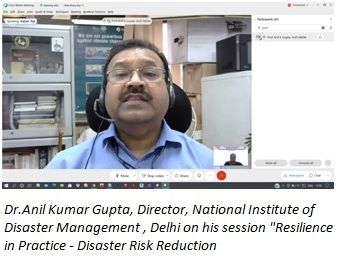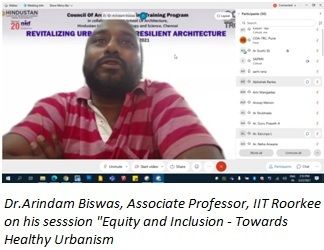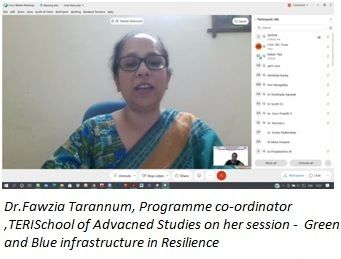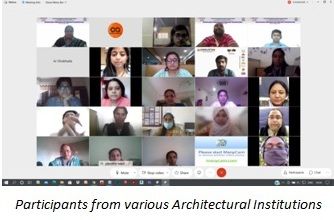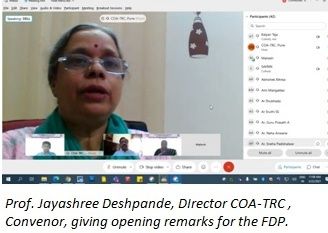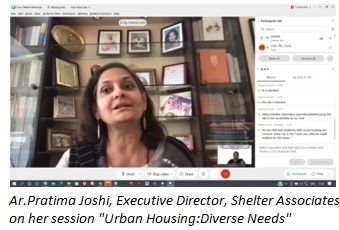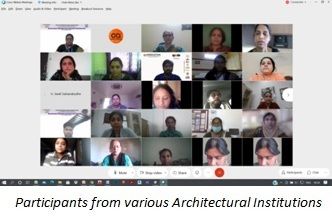-
- Back
-
- Back
-
- Back
-
- Back
-
- Back
-
- Back
-
- Back
-
- Back
Fdp On “Revitalizing Urbanism & Resilient Architecture”
Fdp On “Revitalizing Urbanism & Resilient Architecture”
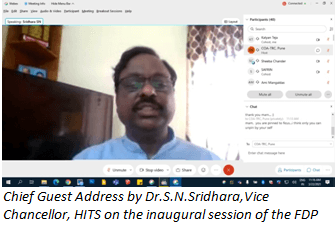
Fdp On “Revitalizing Urbanism & Resilient Architecture”
The School of Planning, Architecture and Design Excellence (SPADE) in collaboration with the Council of Architecture (CoA) Training and Research Center(TRC) conducted a four-day online Faculty Development Programme on the topic “Revitalizing Urbanism and Resilient Architecture”from 22 to 25 March 2021. The FDP had 15 interactive and engaging sessions, with the purpose of introducing the participants to all aspects of revitalization, and urban resilience, in order to equip them with the required knowledge and skill sets to pass on the same to their students.
The programme was inaugurated by Dr.S.N.Sridhara, Vice Chancellor, HITS in the presence of Prof. Jayashree Deshpande, Director, COA-TRC, and the convenor of the programme. The Faculty Development Programme started with opening remarks by Prof. Jayashree Deshpande, Director, COA-TRC continued by the welcome address and introduction of online co-ordinators by Dr. Sheeba Chander, Dean, SPADE, HITS, also, the co-ordinator of the programme. The theme of the FDP was introduced by Ar. Safrin Rex Dulcie, the online co-ordinator
Day 1:
The first session was handled by Dr.Umamaheswaran Rajasekar, Chair, Urban Resilience Unit at National Institute of Urban Affairs on “Urban Resilience at the Global, National and City Level”. He gave a brief about the Urban Resilience Frameworks stating the 7 qualities of resilience. The second session was handled by Ar. Lalit Kishor Bhati, PATH Studio, Aurovilleon of “Resilience for Rising Urban Pressures”, Ar.Lalit explained about the visibility model which relates to the different movements of the city. The third session was handled by Dr.Arindam Biswas, Associate Professor, IIT Roorkee on “Equity and Inclusion – Towards Healthy Urbanism”, where he focused on Inequalities in Society. The fourth session of the day was handled by Prof.Dr.Abdul Razak Mohammed, HOD (Planning),SPA, Vijayawada on “PlaceBased Community Management”, where the session briefly focused on Space Management.
Day 2:
The first session of day two started with Dr. Anil Kumar Gupta, Director, Centre for Excellence on Climate resilience, NIDM, Delhi on “Resilience in practice - Disaster Risk Reduction”. He briefed about the new normalcy. The second session was handled by Dr. Parama Roy, Lead Researcher, Okapi Research and Advisory on “Smart cities and Disaster Resilience”. She briefed about the key stresses of Chennai and Chennai as a resilient city at times of Disaster. The third session was handled by Ar. Vaishnavi Shankar, Research Fellow, Urban Resilience Unit, NIUA, Delhi on “Urban Resilience in the Context of Pandemic”, who spoke on the complex web of Institution, Infrastructure and Information as factors on which a city relies on.The last session of the second day was handled by Dr.Amita Bhide, Dean, School of Habitat Studies, Tata Institute of Social Sciences on “Reciprocal Impact – Human Behavior and Urban Resilience”. She spoke about the risk embedded technologies – its acceptance, its linkage to use, additional risky behaviors, different vulnerabilities, and potentials to commuter organizations.
Day 3:
The first session started with Dr.Sheeba Chander, Dean, SPADE, Hindustan Institute of Technology and Science, Chennai on “Informal Settlements and Pandemic”. She focussed on the current pandemic situation and how informal settlements are getting affected due to the pandemic. The second session was handled by Ar.Pratima Joshi, Executive Director, Shelter Associates, Pune on “Urban Housing: Diverse Needs”. She briefed on the development of slums and how the policies and initiatives should be taken for their welfare. The third session was handled by Dr.Shaleen Singhal, Dean, TERI School of Advanced Studies, Delhi on “Green Growth and Planning”. Dr. Singhal briefed about redesigning of social structures considering both economic debt and climate debt.The last session on the third day was handled by Dr.Fawzia Teranum, TERI School of Advanced Studies, Delhi on “Green and Blue Infrastructure in Resilience”.Dr.Fawzia briefed about the pollution of smart cities and their intelligent waste and water management.
Day 4:
The first session of the last day started with Prof. Tathagata Chaterji, Professor, Xavier University, on “Resilience and Urban Missions”. He briefed about the global and national policy framework and explained shortly upon the 100 resilient schemes proposed by Rockfeller foundation. The second session was handled by Prof. Banashree Banerjee, Urban Planner, Institute for Housing and Urban Development Studies on “Governing Urban Futures – Challenges and Opportunities”. She spoke on the effective implementation of a supportive framework. The session finally concluded stating the better planning of cities for walk able spaces.The final session of the online FDP was handled by Ms.Sreejeetha, Psycologist, DPS, Coimbatore on“Role of Well-being in Urban Resilience”. She spoke on the role of well-being in particular relating to the field of architecture, and highlighted on the eight dimensions of wellness.This particular session had many interactive exercises.
Prof. Jayashree Deshpande concluded the training programme with her remarks and congratulated the institute for conducting the programme meticulously and successfully. Dr.Sheeba Chander proposed the vote of thanks.
